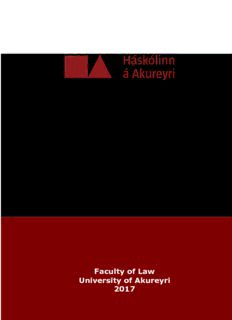
Indigenous Linguistic Rights in the Arctic PDF
Preview Indigenous Linguistic Rights in the Arctic
Indigenous Linguistic Rights in the Arctic: A Human Rights Approach Romain François R. Chuffart Faculty of Law University of Akureyri 2017 Indigenous Linguistic Rights in the Arctic: Human Rights Approach Romain François R. Chuffart 30 ECTS thesis submitted in partial fulfilment of the degree of Master of Arts in Polar Law (MA) Advisor Fernand de Varennes Faculty of Law School of Humanities and Social Sciences University of Akureyri Akureyri, April 2017 Indigenous Linguistic Rights in the Arctic: A Human Rights Approach Arctic Indigenous Linguistic Rights 30 ECTS thesis submitted in partial fulfilment of the degree of Master of Arts in Polar Law (MA) Copyright © 2017 Romain François R. Chuffart All rights reserved Faculty of Law School of Humanities and Social Sciences University of Akureyri Sólborg, Norðurslóð 2 600 Akureyri Telephone: 460 8000 Bibliographic information: Romain François R. Chuffart, 2017, International Human Approach to Indigenous Linguistic Rights in the Arctic, Master’s thesis, Faculty of Law, University of Akureyri, pp. 142 Printing: XX Akureyri, April 2017 Abstract In using an international human rights approach, this thesis assesses the fulfilment of linguistic rights for indigenous peoples and communities living in seven Arctic states (ie Norway, Sweden, Finland, Russian Federation, Canada, USA/Alaska, Denmark/Greenland). The core study of this research is to ask whether the use of an international human rights approach to language rights is best suited to protect the need of Indigenous Peoples in the Arctic. In doing so, this thesis monitors the fulfilment of linguistic rights in three fields which are commonly regarded in several international human rights documents (ICCPR, CRC, ILO 169, UNDRIP, ADRIP) as belonging to realm of basic human rights, namely education, court proceedings, and communication with the authorities. Following a country-specific approach, this thesis concludes that although Arctic indigenous linguistic rights are already enshrined in key legally-binding instruments and in documents, which reflect lex feranda and could lead to legislative improvements, States mostly rely on their own domestic legal systems through they implement the checks and balances that protect linguistic rights. To my family. Preface The Arctic is full of different contexts and different realities. Not only in terms of the different bodies of laws and approach to domestic and international law, but also from a sociological and cultural viewpoint. In any research involving the Arctic, it has now become common-place to compare Arctic regions with one another. Understandingly so, such an approach helps feeding the Arctic academic bubble, so to say, insofar as it helps outlining the common features shared by peoples across the Arctic. Relying on this approach, this Thesis aims at drawing attention to linguistic rights for indigenous peoples in comparing the fulfilment of these rights in the North American Arctic, in the European Arctic, and in the Russian Arctic. Language playing such a key role for human beings to develop their own cultures and traditions, it seemed almost logical to shed a human rights light to the present research. Within the present Canadian context regarding indigenous rights, the author thinks this comparison could come in a timely fashion as the debate about implementing the UNDRIP into domestic law is yet again making an appearance in Canadian political life – with the Trudeau government talking about UNDRIP’s potential implementation. Comparing both the domestic systems and international engagements of European Arctic States and of North American Arctic States, whose realities are generally far apart, allows to highlight the plurality and the core differences of Arctic legal theories, especially on a concept as unique as linguistic rights. Table of contents Table of Cases ...............................................................................................xi Table of International Treaties ................................................................ xiii Table of Legislation ....................................................................................xix Acknowledgements .................................................................................. xxiii 1 Introduction ............................................................................................ 25 1.1 Research Question ......................................................................... 27 1.2 Methodology and Structure ........................................................... 28 2 Linguistic Human Rights ....................................................................... 30 2.1 Definition ....................................................................................... 30 2.2 Human Rights Jurisprudence ......................................................... 32 2.3 International Documents ................................................................ 35 2.3.1 Language Rights as Human Rights ................................... 36 2.3.2 Other Approaches to Language Protection ........................... 49 3 Indigenous Language Rights in the Arctic ........................................... 52 3.1 Norway .......................................................................................... 53 3.2 Sweden ........................................................................................... 60 3.3 Finland ........................................................................................... 64 3.4 Russian Federation ......................................................................... 67 3.5 Canada ........................................................................................... 74 3.5.1 Northwest Territories ........................................................ 83 3.5.2 Yukon ................................................................................ 84 3.5.3 Nunavut ............................................................................. 92 3.6 United States: Alaska ................................................................... 105 3.7 Kingdom of Denmark: Greenland ............................................... 110 4 Conclusion............................................................................................. 119
Description: